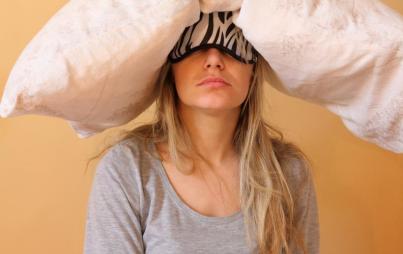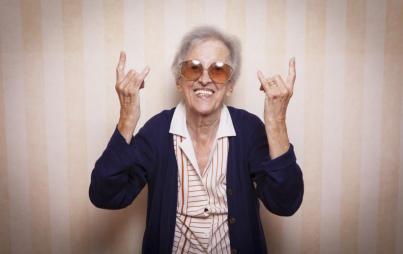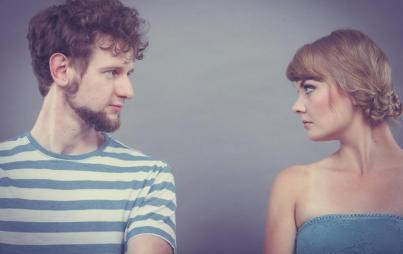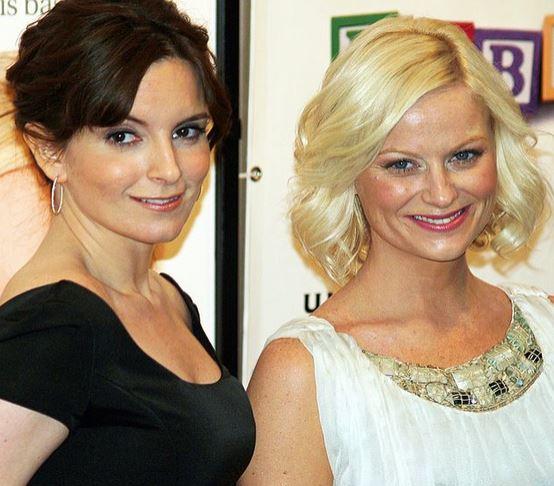
Credit: Thinkstock
It's safe to say that last night's Golden Globes ceremony was a good one for women in comedy. The show was hosted by Tina Fey and Amy Poehler, who once again delivered enough clever yet biting Hollywood punch-lines to land them in the much-coveted ring of celebrated emcees (critics are often brutal)—and who took the opportunity to tackle some female issues as well, notably ripping into sex abuser Bill Cosby.
In addition to boasting the unflagging wit of the dynamic duo, the Golden Globe's nomination list for Best TV Comedy was also dominated by shows about funny women: Orange Is The New Black, Jane the Virgin, and Girls, with Transparent—a show focusing on a transitioning trans woman—pulling down the top honor.
But perhaps above both these not-so-small victories was the explicit examination and calling out of the comedy gender gap. On stage as presenters, 9 to 5 co-stars Lily Tomlin and Jane Fonda made a little dig when talking about Jeffrey Tambor winning the best actor award for Transparent. "It's nice at last that men are getting the recognition they deserve for being good at comedy," Fonda joked. "You've come a long way, baby."
Her words called attention to an issue far too infrequently addressed: the enduring gender gap (or is that gaping chasm?) in the male-dominated field of comedy. Indeed, despite obvious societal strides across the cultural board and illustrated last night, it's worth pointing out that the nominated comedy films—Birdman, Into the Woods, Pride, St. Vincent, and the winning The Grand Budapest Hotel—were all directed by men and, save for Into The Woods, feature a male protagonist or protagonists in the lead. Men also helmed all the comedic nominated animated features—The Lego Movie, Big Hero 6, The Boxtrolls, How To Train Your Dragon 2, and The Book of Life . . . which coincidentally largely focus on boy lead characters.
To open up a dialogue about this issue during its no-doubt fleeting moment of attention, we're sharing a few key insights from a recent Conversation series we did, in which we asked female comedians this deliberately loaded, ridiculous question: Are men really funnier than women?
Here's what they had to say.
Krystyna Hutchinson and Corrine Fisher
Hosts of Guys We Fucked: The Anti Slut-Shaming Podcast
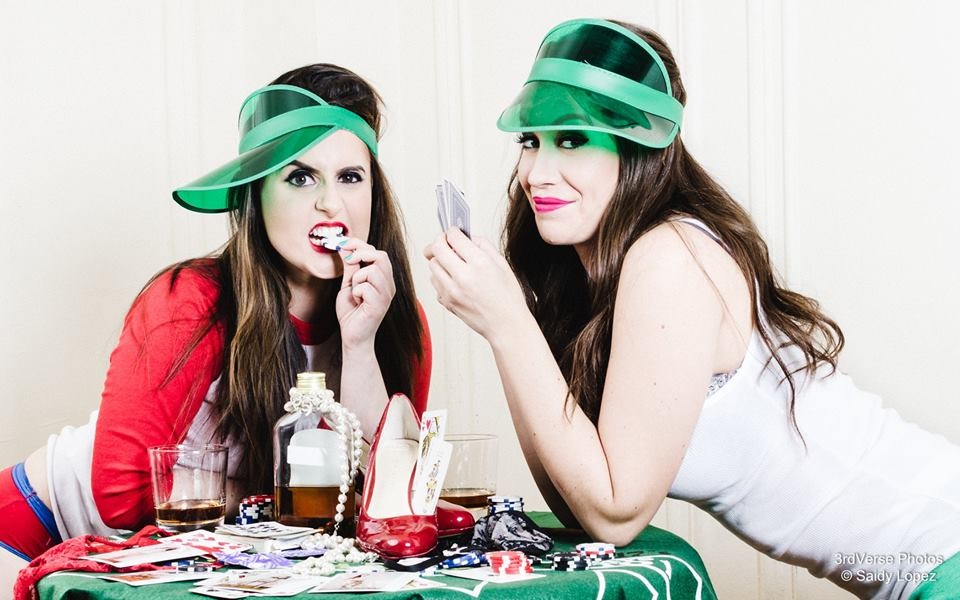
Hutchinson:
Normal people (aka people who aren’t stand-up comedians) have asked me what it’s like to be pursuing a career field that's male-dominated. I’ve always been confused by this question because I don’t see comedy as being male-dominated, I see it as a field where funny, intelligent, forward-thinking individuals thrive. It just so happens that if you do the math, there are more male comics than there are female comics, all varying levels of insane. So . . . cool!
I think it’s clear to all sensible people that being funny has nothing to do with your gender. If you’re reading this and you believe that being funny does correlate with your gender, then you are a moron who shouldn’t be allowed to vote or operate a vehicle. I mean, no one is asking if white people are really funnier than black people, because that’s a stupid question. Of course white people are funnier than black people! Arab people are funnier than Puerto Rican people, Chinese people are way funnier than Japanese people (who knew those were even different, amiright?!), and German people will never be a part of any discussion involving humor.
I digress.
Last week, an audience member came up to me after a show and gave me the whole “You know, I usually don’t think women are funny, but . . . ” spiel. I’ve heard this from men and women and it always makes me laugh. They don’t realize that what was intended as a back-handed compliment is really just a giant red flag letting me know they’re stupid and I should stop talking to them immediately. I used to list off people like Bamford, Leggero, Silverman and Notaro (the usual response being: “who?!”), but it came to my attention that a lot of people are simply content staying in the narrow-minded world they’ve created for themselves in their head and to be in any way affected by that person’s opinions is just . . . silly.
Fisher:
Are men really funnier than women? I feel like for me to answer this question would mean that for even one second I felt insecure enough in my abilities that I felt the need to defend them.
Kellye Howard
Comedian featured on Comedy Central and Last Comic Standing
Are men funnier than women? Well yes, if you take into consideration the limitations and expectations of how a woman should behave based on society. But . . . not necessarily if you equalize women and have no pre-judgments on what we can and cannot do.
Some of my favorite comedians are women, and not because I'm a female comic myself. They are original and fearless in a world that injects fear into women. Lucille Ball, Moms Mabley, Joan Rivers, and Tina Fey, to name a few, are some of the funniest people to ever live. Notice I said people and not women. These particular comedians went directly against any rules and regulations of how a woman should carry herself. They challenged the social norms.
Men are funny, and so are women; but to say one is funnier than the next would be snubbing the very concept of comedy. Comedy is about taking the woes of life and laughing at them. Everyone has pain; everyone has been hurt, belittled mourned someone, cried sadly, cried laughing, or just cried him or herself to sleep. Emotions are genderless. Why should we categorize who's skilled enough to help us through those moments of sadness? Who's telling the joke and making the funny face or noise or writing the script is ultimately irrelevant.
Charlene deGuzman
Writer and performer in Los Angeles, California

I googled “Are men funnier than women?” Apparently, this is an actual topic people actually discuss. I think it’s as pointless as asking who’s hotter, or who’s cooler, or “Is my mom better than your mom?” . . . but this is the internet, where passionate opinions on completely subjective topics go to breed, after all.
There’s a feminist who thinks women are funnier, and there’s a feminist who thinks men are funnier. There are scientists who tell us that women laugh more than men, but men write funnier New Yorker captions. There are, unsurprisingly, a lot of men who think men are funnier. And of course, Cosmopolitan has 10 reasons why women are funnier for sure, the eighth reason actually being “periods.”
I sighed.
I closed my laptop and decided to take matters into my own hands. I don’t care who hosts late-night TV shows, headlines comedy clubs, or stars in blockbusters. I was on a mission to see for myself, I was going to take a look at my real life:
1:03PM
I ask the waiter if I can have a side of macaroni and cheese. “More like crack and cheese, am I right?” I laugh. I repeat it four times to myself during the meal. One point to men.
3:24PM
I check Facebook on my phone. “I do not like sneaky ass bitches, LOL” posts a girl I took one gymnastics class with when I was seven. I personally think sneaky ass bitches have trouble loving themselves and therefore put walls up for protection. I do not LOL. Zero points to women.
4:57PM
Text from my mom: “What does ‘obvi’ mean?” One point to women.
7:41PM
It looks like a labradoodle is driving a Prius. One point to labradoodles.
9:15PM
There’s nothing funny about a room full of twenty-somethings aggressively drinking through their fear. Zero points.
11:21PM
A guy sweating in a fashion scarf. One point to men.
2:13AM
I lie in bed alone, fake-smiling toward the ceiling after reading an article that said I could rewire my brain into thinking it was happy. I am hilarious. One point to women.
Final total: Men, 2 points. Women, 2 points.
As you can see, the results of my research are not only disappointing, but completely worthless. In conclusion, it’s safe to say that some people are funny, and some people are not. Some people are funny even if it wasn’t their intention to be funny. And there are people you don’t find funny who are successful comedians.
Being labeled as “funny” is a special gift that isn’t dependent on gender, it’s dependent on the audience that is deciding. And there are audiences for everyone. A baby once laughed so hard because I was holding a rock.
Jessica Delfino
Comedy musical performer who's appeared on programs including Good Morning America and the Russell Brand radio show
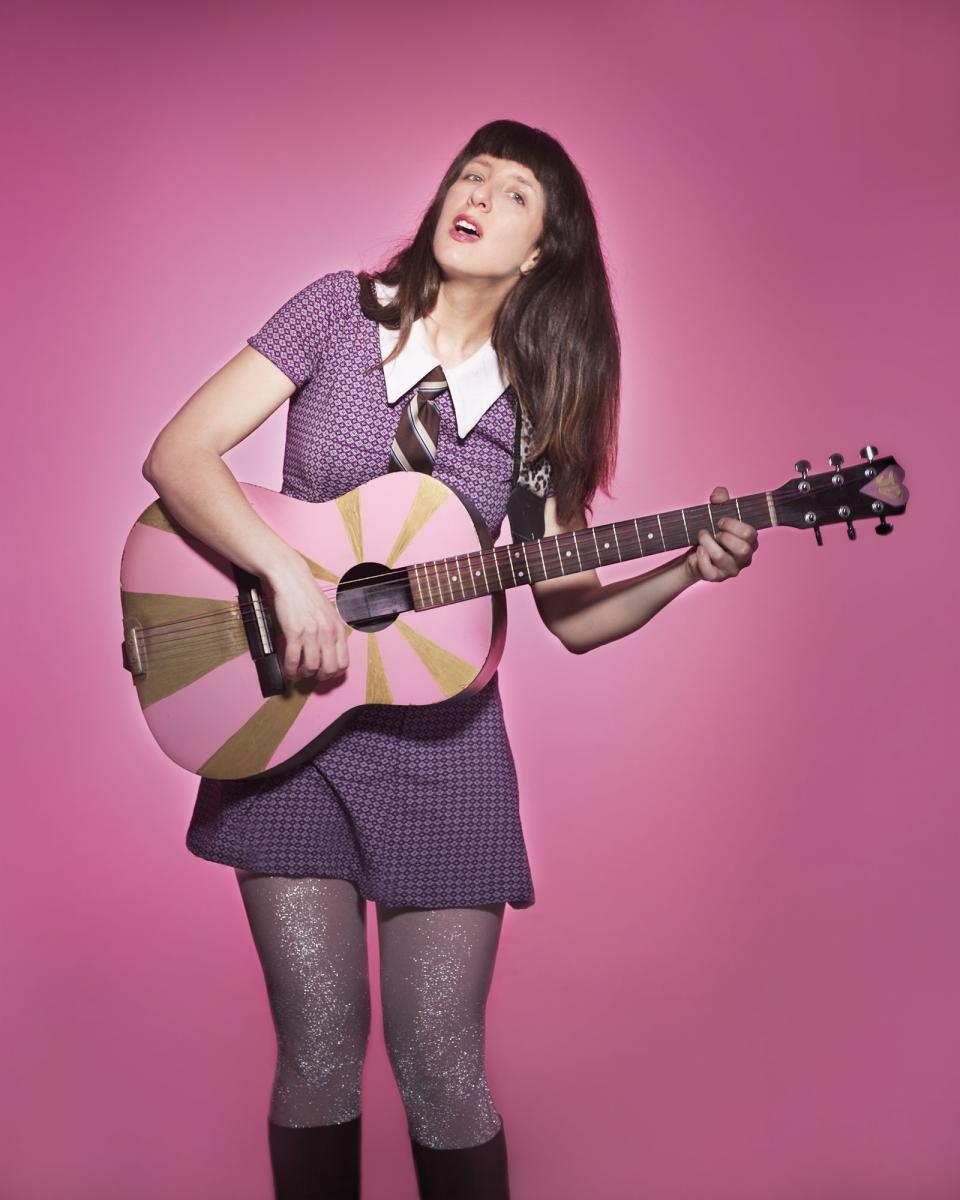
Argument:
Well, Jerry Lewis/Christopher Hitchens/Martin Short/my drunk Uncle said that women aren’t funny, and I like those guys, therefore, women aren’t funny.
Case closed:
When recently (2013) asked at the Cannes Film Festival if women are funny, Jerry Lewis, then 87, said "I can't see women doing that. It bothers me . . . I cannot sit and watch a lady diminish her qualities to the lowest common denominator . . . I just can't do that." This isn’t the first time he’s voiced his opinion about women in comedy. But let’s examine the facts. Jerry was just 20 years old when he started his comedy duo act with Dean Martin. The year was 1946. Life was dramatically different—most people didn’t have a TV, and most women were not liberated or even wearing pants.
The world of the 1930s that Jerry Lewis grew up in was one where women were treated primarily as possessions and baby makers. That is not an excuse for his ignorance, but the fact is, he is an alien living in another time on a different planet. He probably also shits himself sometimes. My grandfather in his 80s says some pretty insane things too, but he’s not a famous comedic celebrity speaking on the topic of female comedians, so no one cares. Asking Jerry Lewis what he thinks about women in comedy almost isn’t fair. It’s like asking Hermann Göring what he thinks about Jewish people. You know what he’s going to say.
Christopher Hitchens was probably kidding, in some sense, as was Martin Short. Not every joke lands the way we want it to, but Christopher Hitchens was an over-the-top guy and he knew exactly what he was doing, and how the public would react. He spoke and wrote like a typical alpha every-dad who knows it all. That was his gig. You’ve heard of low-brow humor—Hitchen’s act was low-blow humor. The guy dissed Mother Theresa. Nary a moment went by that he wasn’t loaded on booze, like most comedians—and it fueled his over-the-top act, which mingled with his real-life personality, and even inspired Ann Coulter’s comedy routine.
The fact is, the statement “women aren’t funny” is a joke. At this point, it’s an easy one. People know it’ll get attention. Some people really have a hard time taking a joke, especially if the joke is on them. But even if Hitchens, Short and any other blow hard, antique-minded man who said "women aren’t funny" weren’t kidding in some aspect, it doesn’t matter. Martin Short is no longer relevant and Hitchens is dead. His and other people’s words linger on, only because the media knows that the story (and it is just another bedtime story) “women aren’t funny” will generate hits and make money. If you really don’t believe that women are funny, that’s OK. Not everyone believes that all people’s opinions are valuable.
If you do believe that women are funny, prove it by voting with your dollars. Go to see female comedy shows. Invest in and produce female-fronted scripts, plays and TV shows. Encourage your son to get a sex change and push him, er, her into comedy. They’ll have some great material for it.
Natasha Pearl Hansen
Los Angeles-based comedian, actress, and producer

I stand in the shadows of the stage, thinking, “I hope this outfit says ‘confident and intelligent' to the women and ‘attractive, yet non-distracting’ to the men."
Actually, no.
I hope the women in the audience think, "Hey, I could be her friend," and the men think, "I wanna grab beers with that bitch." Yeah, that’s better. I cross my fingers that my kitten-heeled pumps don’t fail as I prepare to take the stage and then . . . "This next comedian is a very sexy lady. She better be as funny as she is sexy . . . Natasha Pearl Hansen!”
As a female stand-up comedian, this call to the stage is something I’ve grown accustomed to debunking as soon as my lips hit the mic each night. It always comes down to one simple concept: Comedy and perception are a science. To men, women are sexy. To women, women are also sexy. Basically what I’m saying is women are sexy. And even though there is power in that attribute, it proves to be one of the largest roadblocks we, as women, face when it comes to being taken seriously as funny.
Humor can be summed up into three qualities: sex, capability and relatability. People laugh at what they relate to. Women find women funny because whether or not we want to admit it, we all have similar characteristics: We cry, pine, shop, care, love, need and console. Same goes when relating to intellectuality, race, culture, status, laws, communities, etc. However, we also find humor in the things we don’t relate to personally, yet observe from afar. Prime example: I overheard a woman at Starbucks in Beverly Hills complain about having to cash in one of her gold bars because it was a "bad month financially." People have gold bars? I had no idea safes containing bricks of precious metal was even a thing—besides in Ducktales cartoons.
Men and women find each other’s behavior to be humorously entertaining because we are in relationships with each other. We are surrounded by each other. We both understand and don’t understand each other. Gender bias in comedy, even though it has been around since Shakespeare and Vaudeville, has proven to be increasingly irrelevant throughout the years. Men are realizing that women, distracting creatures that they may be, are also, in fact, funny. Men tend to find men more humorous, and women gravitate towards their own as well. But, on the same note, laughing at the opposite sex feels increasingly natural. Finally, I feel like we are all on an even playing field when it comes to be considered legitimately funny.
Leah Bonnema
Comedian who's been featured on AXS TV’s Gotham Comedy Live, VH1, and in the Huffington Post as one of their "Favorite Female Comedians"

By responding to "are men funnier than women" I feel I've agreed that the question itself seems somehow reasonable, which I in fact do not. I believe the real question is: Why are we asking? I think at the very heart of this issue is that what we've culturally deemed to be "feminine" is at odds with how funny works. It is a set-up.
On a show featuring eight comics, typically seven of them will be male. This isn't because there's only one female available, but because that's the girl spot. Women are still seen as a niche. Comic equals male. Female comic is a deviation from the standard. So audiences get less of an array of different female types and points of views coming from women. But comedy is not The Highlander; there can be more than one.
Women are often raised to be people pleasers. To make sure everyone around them is comfortable. To avoid conversations or opinions that might seem rude to others. Being funny depends on presenting a perspective, regardless of whom it offends. It also often means laying out ones flaws for the whole world to see. It means letting everyone know just how perfectly unpleasing you really are.
To be funny is to be foolish, to try new things and often fail, publicly. These qualities aren't on the lady-like behaviors list, but they are on the path to funny. I think women aren't raised to deal with rejection (and I know that because I wrote "I think" at the beginning of this sentence instead of just making it a statement), but being in comedy means getting rejected, a lot.
It seems harder for women to say "I am funny" because it sounds self-important, another big no-no on the list of lady-like qualities. Although I'm absolutely sure my male colleagues feel bad when they bomb onstage or get hateful comments on social media, I'm not sure it hits them as hard on the "what's wrong with me" scale. I often hear my male comic friends say "what's wrong with them, I'm funny"—a stance I think one must sometimes take to carry on.
Women are criticized when they seem aggressive, too loud, overly sexual, not sexual enough, penalized for stepping outside the feminine demure box. I don't believe male comics get attacked in the same manner because they're allowed culturally to make strong choices, whereas women, culturally, are supposed to wait to get chosen. How boring and unfunny is that?!
Eirann Dolan
San Francisco-based speechwriter
Are men funnier than women? Ever since I was a little girl, that question has plagued me. Was my brother TJ really funnier than I was?
Why did my parents laugh harder when he stuck his takeout food chopsticks in his mouth and pretended to be a walrus than they did when I put lo mein noodles on my head and pretended to be that very same walrus?
Why did our friends think it was funny when TJ danced in our Irish dance recitals, but not when I did?
Was he funnier, or did people just like TJ more? Neither. It was actually sexism.
Sexism would have us believe that men are funnier than women. Sexism would make my parents think it was a good idea to have two sons but only one daughter. Are men really two times better than women? Is that what my parents would have us believe?
Please, don't ask me if men are funnier than women. Why don't you ask Josephine and Daphne. Or ask Mrs. Euphegenia Doubtfire. Ask Tootsie or Tyler Perry's Madea.
I think they'll all agree with me: Women are funnier than men.


![Photo credit: By Stand-Up Sucks, LLC - "I Am Comic" Directed by Jordan Brady and distributed by Monterey MediaLocated on Monterey Medias Flickr account. [1], CC BY-SA 3.0, https://commons.wikimedia.org/w/index.php?curid=14615036 Photo credit: By Stand-Up Sucks, LLC - "I Am Comic" Directed by Jordan Brady and distributed by Monterey MediaLocated on Monterey Medias Flickr account. [1], CC BY-SA 3.0, https://commons.wikimedia.org/w/index.php?curid=14615036](/sites/default/files/styles/profile/public/images/article/2019-06/1200px-Roseanne_barr.jpg?itok=icUN7jju)
